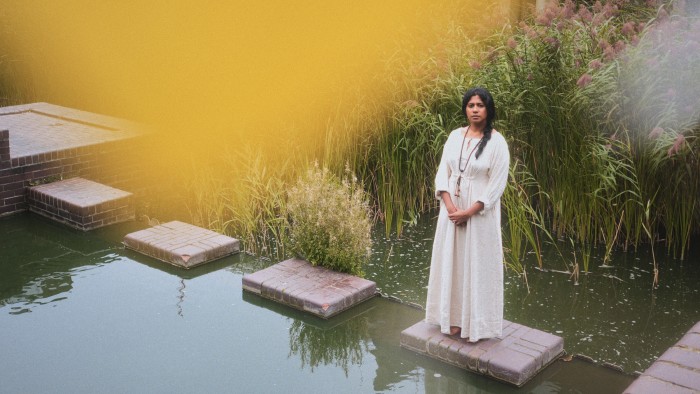Unlock the Editor’s Digest for free
Roula Khalaf, Editor of the FT, selects her favourite stories in this weekly newsletter.
New York-born artist Ganavya Doraiswamy, 34, was brought up in a strong musical tradition. Her father’s family are a clan of south Indian classical Carnatic musicians, dancers and composers. She spent much of her childhood in the state of Tamil Nadu in intensive artistic training, first as a dancer and then as a singer. The philosophy was “the better you are as a musician, the closer you are to God”, she says wryly. But it was only in the 2010s, when she began singing in a bar near Berklee College of Music’s Valencia campus, where she was studying, that she encountered jazz. She heard something in it she recognised. “While not necessarily mutually legible with the language I grew up with, it shared some spiritual root, which was improvisation,” she says. Back in the US, Alice Coltrane’s book Monument Eternal led her to spiritual jazz, the melding of philosophical enquiry with free improvisation and eastern techniques that emerged in the late 1960s.
These influences have formed the bedrock of her practice. Her recent album Nilam, recorded in Berlin with co-producer Nils Frahm on a brief break from touring, doubles down on the spiritual explorations, with her vocals supported by the yazh, a bird-shaped ancient harp. She sings in Tamil, Old Marathi and English in fluttering microtonal runs, as if conversing with a deity or musing to herself. Her lyrics range from the practice of devotion to familial relationships. One track, “Not A Burden”, reflects on the mutual relationships between mothers and daughters. “Is the tree a burden for the earth?” she sings in Tamil. “Is the fruit a burden for the branch?”
Though now based in Berlin and London, she still finds ways to evoke the collaborative musical atmosphere in which she grew up. In 2022, she convened a small army of collaborators in Houston and spent a week recording reworkings of music by Alice and John Coltrane, initially with no intention of releasing it. “I rented the entire street, and we all lived together,” she says. “I wanted to remember what it felt like to be in a village again. It was just an opportunity to study together and to feel, to eat together.” Her mother came and cooked for everyone. Some of the music they made became Daughter Of A Temple, a reclamation of the Indian influences of some of Alice Coltrane’s albums.

Other compositions have been equally contingent: British jazz composer Shabaka Hutchings summoned her to London to make Like the Sky I’ve Been Too Quiet, a series of improvisations, a couple of which were recorded in an echoing underpass. And performing with British R&B and gospel group Sault recently, she riffed on “Ever So Lonely” by Sheila Chandra, the British singer who merged western and Indian pop in the 1980s with her band Monsoon, but had to give up singing after developing burning mouth syndrome. “So many people did what they did so that I could have the life that I have, and Sheila is high up on that list,” says Doraiswamy. “I want to sing that song, because I want her to know that she’s still here. And my tongue can speak if not for her, then to her.”
Ganavya is playing at Warwick Arts Centre on 5 October. Nilam is out on Leiter
